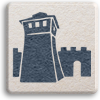Both, buildings and populations units, are tied to cities. Population units are the basic generator of research points, commerce value points, manpower (points) and base tax points. Buildings then add modifiers to the points generated by the pops to obtain the total generated amount. The total amount of possible buildings in a city depend on the amount of pops living in it.
The capital starts with 1 fort by default. Any building, except the capital fort, can be torn down at any time for free.
Building types
| Building | Province modifiers | |
|---|---|---|
 |
Marketplace | |
 |
Training Camp | |
 |
Fortress | +1 Fort level |
 |
Granary |
Each building type costs a ![]() 100 gold and can be built multiple times, the province modifiers are summed.
100 gold and can be built multiple times, the province modifiers are summed.
City building limit
Each city can have at least 1 building, and each additional 10 pops in that city allows another building level. The capital city starts with one extra building slot that is used by the default capital fort. 1 additional building slot per city may be gained through the tech 18 Civic Invention 'Urban Planning'.
Roads
Roads are buildings visible on the map that increase army movement speed by 50%. If a road is built over a river, a bridge will appear.
There are two ways to build roads, one for countries with any military traditions other than Italic traditions. The other is for countries with the Italic traditions.
Regular roads
Regular countries need a civic advances level strictly higher than 6.
Once this is done, all their armies satisfying these requirements can be used to build a road:
- Must have at least 10 cohorts
- Must not be in combat
- Must not be moving
- Must not be exiled
- Must be next to a province held by the same country. These two provinces cannot already have a road between them.
- Must have a commander, whose loyalty is strictly higher than 33.
If these requirements are met, the army's owner can pay ![]() 20 Military power to start the road construction. By then moving the army to another province, and waiting for the army to arrive to that other province, the road will be built.
20 Military power to start the road construction. By then moving the army to another province, and waiting for the army to arrive to that other province, the road will be built.
While the road is being built, the following modifiers are applied to the army:
- Army Movement Without Roads: -90%
- Army Maintenance Cost: +120% (for a total of 220% regular maintenance cost)
- Morale of Armies -20%
If, for any reason, the road cannot be built, the ![]() Military power cost will be refunded.
Military power cost will be refunded.
Roman roads
Countries with the Italic traditions have to pick Roman Roads from the Roman path.
Once this is done, the only difference with the regular roads builder is that the army can be smaller, with at least 5 cohorts. All other conditions are identical.
The mechanic for building the roads is the same, but the cost of lower, at only ![]() 10 Military power.
10 Military power.
While the road is being built, the following modifiers are applied to the army:
- Army movement without roads: -90%
参考资料
